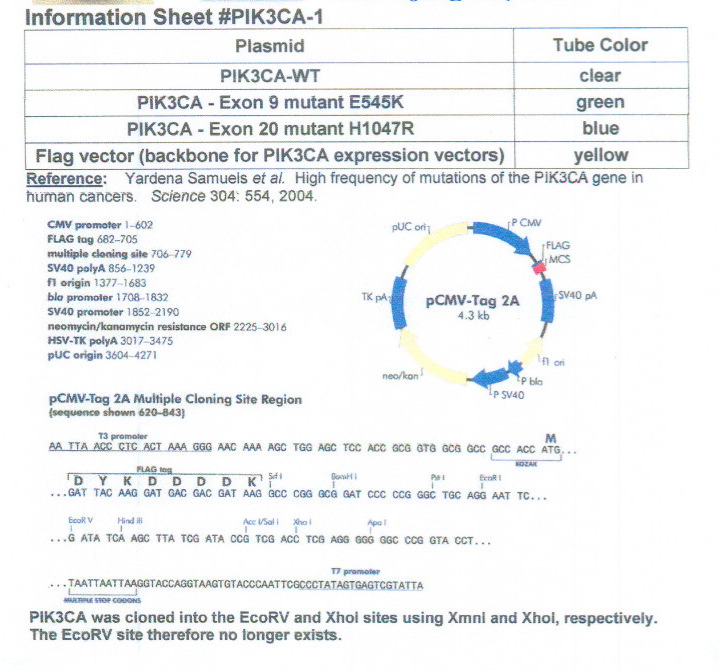-
Depositing Lab
-
Publication
-
Sequence Information
Ordering
| Item | Catalog # | Description | Quantity | Price (USD) | |
|---|---|---|---|---|---|
| Plasmid | 16642 | Standard format: Plasmid sent in bacteria as agar stab | 1 | $89 | |
Backbone
-
Vector backbonepCMV2-Tag 2A
-
Backbone manufacturerStratagene
- Backbone size w/o insert (bp) 4300
-
Vector typeMammalian Expression
-
Selectable markersNeomycin (select with G418)
Growth in Bacteria
-
Bacterial Resistance(s)Kanamycin, 50 μg/mL
-
Growth Temperature37°C
-
Growth Strain(s)DH5alpha
-
Copy numberHigh Copy
Gene/Insert
-
Gene/Insert namePIK3CA E545K
-
Alt namePhosphatidylinositol 3-kinase
-
Alt namep110 alpha
-
SpeciesH. sapiens (human)
-
MutationE545K; see note below
-
Entrez GenePIK3CA (a.k.a. CCM4, CLAPO, CLOVE, CWS5, HMH, MCAP, MCM, MCMTC, PI3K, PI3K-alpha, p110-alpha)
-
Tag
/ Fusion Protein
- Flag (N terminal on backbone)
Cloning Information
- Cloning method Restriction Enzyme
- 5′ cloning site EcoRV / XmnI (destroyed during cloning)
- 3′ cloning site XhoI (not destroyed)
- 5′ sequencing primer T3
- 3′ sequencing primer T7 (Common Sequencing Primers)
Resource Information
-
Articles Citing this Plasmid
Terms and Licenses
-
Academic/Nonprofit Terms
-
Industry Terms
- Not Available to Industry
Trademarks:
- Zeocin® is an InvivoGen trademark.
Depositor Comments
This plasmid has several discrepancies in the ORF compared to the NCBI reference (NM_006218.3): N114D, L177S, T322A, A400V, L404P. These mutations do not alter the function of the encoded protein as described in the associated publication.
These plasmids were created by your colleagues. Please acknowledge the Principal Investigator, cite the article in which the plasmids were described, and include Addgene in the Materials and Methods of your future publications.
-
For your Materials & Methods section:
PIK3CA - Exon9 E545K was a gift from Bert Vogelstein (Addgene plasmid # 16642 ; http://n2t.net/addgene:16642 ; RRID:Addgene_16642) -
For your References section:
High frequency of mutations of the PIK3CA gene in human cancers. Samuels Y, Wang Z, Bardelli A, Silliman N, Ptak J, Szabo S, Yan H, Gazdar A, Powell SM, Riggins GJ, Willson JK, Markowitz S, Kinzler KW, Vogelstein B, Velculescu VE. Science. 2004 Apr 23. 304(5670):554. 10.1126/science.1096502 PubMed 15016963





